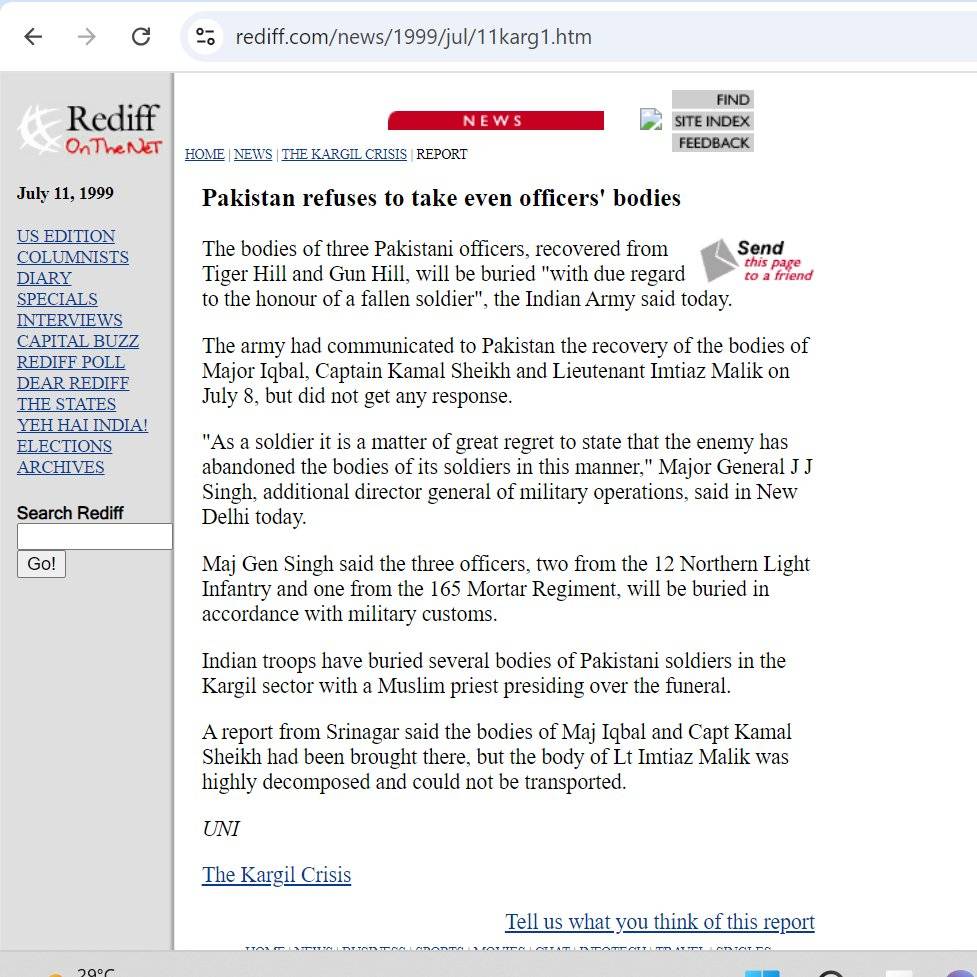AI Generated Summary
- In a surprising revelation, General Asim Munir, the Chief of the Pakistan Army, appeared to officially acknowledge Pakistan’s role in the 1999 Kargil War, marking a significant shift in the narrative surrounding the conflict.
- In Pakistan, Lt Gen (retd) Shahid Aziz, a former Pakistani military officer, has previously discussed the secretive nature of the Kargil operation, describing it as a “four-man show” that involved only General Pervez Musharraf and a select group of senior commanders.
- “In 1948, 1965, 1971, and Kargil wars between India and Pakistan, as well as in Siachen, thousands have sacrificed themselves in these conflicts,” he stated, underscoring the gravity of the losses on both sides.
In a surprising revelation, General Asim Munir, the Chief of the Pakistan Army, appeared to officially acknowledge Pakistan’s role in the 1999 Kargil War, marking a significant shift in the narrative surrounding the conflict. Speaking at the Pakistan Army’s Defence Day event, Munir referenced the Kargil conflict alongside other historical wars with India, a notable departure from past denials by Islamabad.
First time ever #PakistaniArmy accepts involvement in #KargilWar. Pakistan Army Chief General #AsimMunir confirms Pakistan Army's involvement in #KargilWar. Pakistan Army Chief General Asim Munir in a defence day speech on Friday said, "1948, 1965, 1971 or Kargil war between… pic.twitter.com/Um83MwSrwM
— Upendrra Rai (@UpendrraRai) September 7, 2024
During his speech at the army headquarters in Rawalpindi, Munir reflected on the sacrifices made during various wars, including the Kargil War. “In 1948, 1965, 1971, and Kargil wars between India and Pakistan, as well as in Siachen, thousands have sacrificed themselves in these conflicts,” he stated, underscoring the gravity of the losses on both sides.
The Kargil War, which unfolded between May and July 1999, was a conflict marked by Pakistani troops infiltrating Indian territory in the Kargil district of Jammu and Kashmir. India’s Operation Vijay ultimately repelled the intruders, restoring control over the strategic heights and dealing a significant blow to Pakistan’s military objectives.

Historically, Pakistan has consistently denied direct military involvement in the conflict, often referring to the infiltrators as “Kashmiri freedom fighters” or “mujahideens.” Islamabad’s official stance had been that Pakistani forces were engaged in border patrols while local tribal leaders occupied the heights.
General Munir’s comments have sparked considerable discussion on social media, with many recalling past controversies, including the refusal of Pakistan to accept the bodies of its fallen soldiers. This reluctance to acknowledge the soldiers’ deaths has long been a point of contention and criticism.
The admission comes in the wake of past critiques from Pakistani figures, including former Prime Minister Nawaz Sharif, who has described the Kargil operation as a “strategic blunder” and “political disaster.” Sharif, who was in office during the war, has openly criticized the operation, which he claims was poorly managed and misjudged.
Many Indian army veterans and current servicemen see the admission as long-overdue recognition of their efforts and sacrifices during the conflict. They express satisfaction that the truth about the war’s origins and the intense combat faced by Indian forces is now being officially acknowledged. However, some remain cautious, noting that while the admission is a significant step, it does not erase the years of denial and the challenges endured by Indian troops during the war. The acknowledgment also serves as a reminder of the sacrifices made by Indian soldiers, who were instrumental in reclaiming the strategic heights and ensuring a decisive victory.
Yes, perhaps the first time admission by Pakistan, by the Army Chief, no less
— Lt Gen Satish Dua 🇮🇳 (@TheSatishDua) September 7, 2024
In Pakistan, Lt Gen (retd) Shahid Aziz, a former Pakistani military officer, has previously discussed the secretive nature of the Kargil operation, describing it as a “four-man show” that involved only General Pervez Musharraf and a select group of senior commanders. Reports suggest that even senior government officials, including Sharif and the heads of the Air Force and Navy, were not fully informed about the operation’s scope.
The strategic aim of the Kargil War was to sever the link between Kashmir and Ladakh, disrupt the National Highway-1, and force Indian forces to withdraw from the Siachen glacier. The planners hoped this would compel India to negotiate on Islamabad’s terms regarding Kashmir. However, the operation failed dramatically, with Indian forces successfully retaking key positions and pushing back the Pakistani troops. The conflict concluded with the Indian victory, marked by the formal announcement of Operation Vijay.
This latest acknowledgment by the Pakistani Army chief has reignited discussions about the Kargil War, a conflict that remains a poignant and controversial chapter in the history of Indo-Pak relations.




